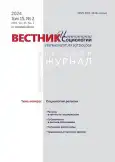Involvement of modern parents in practices related to children
- Authors: Dorofeeva Z.Y.1,2, Kozyreva P.M.2,1
-
Affiliations:
- HSE University
- Institute of Sociology of FCTAS RAS
- Issue: Vol 15, No 2 (2024)
- Pages: 115-131
- Section: Problems of Education and Upbringing in Modern Russia
- URL: https://journal-vniispk.ru/2221-1616/article/view/271691
- DOI: https://doi.org/10.19181/vis.2024.15.2.8
- EDN: https://elibrary.ru/PRHJIV
- ID: 271691
Cite item
Full Text
Abstract
It is noted that if the child’s younger age requires the involvement of at least two adults, then starting from school age, most practices are assigned to only one of them, while vacation is a practice in which parents most often participate jointly. The contribution of other relatives is assessed. It has been shown that the presence of grandparents in the household significantly reduces the workload of mothers. An increase in the number of children in a family has virtually no effect on the level of involvement in general, but it changes the structure of its practices, while the level of involvement of other relatives decreases. The greatest influence on involvement is exerted by the individual indicators of parents, especially education - a mother’s higher education increases the number of hours devoted to children; Most of parental time is spent preparing lessons with children, which in turn affects academic performance. It is noteworthy that the number of hours parents work is positively related to the level of involvement. The conclusion is made about the stability of maternal and vulnerability of paternal involvement.
Keywords
About the authors
Zlata Y. Dorofeeva
HSE University;Institute of Sociology of FCTAS RAS
Email: zdorofeeva@isras.ru
ORCID iD: 0000-0003-2099-624X
SPIN-code: 3984-7680
ResearcherId: T-9563-2018
Candidate of Sociological Sciencesy, Researcher of the Center for Longitudinal Studies at the Institute for Social Policy, HSE University, Moscow, Russia; Researcher at the Department of Research on the dynamics of Social Adaptation, Institute of Sociology of FCTAS RAS, Moscow, Russia Moscow, Russia
Polina M. Kozyreva
Institute of Sociology of FCTAS RAS;HSE University
Email: pkozyreva@isras.ru
ORCID iD: 0000-0002-3034-8521
SPIN-code: 7548-7264
ResearcherId: F-2538-2014
Doctor of Sociological Sciences, First Deputy Director of the Institute of Sociology of FCTAS RAS, Moscow, Russia; Head of the Center for Longitudinal Studies at the Institute for Social Policy, HSE University, Moscow, Russia Moscow, Russia
References
- Авдеева А. В. «Вовлеченное отцовство» в современной России: стратегии участия в уходе за детьми //Социологические исследования. 2012. № 11. С. 95–104. EDN: PGXURD.
- Антипкина И. В., Любицкая К. А., Нисская А. К. Вовлеченность родителей третьеклассников в учебные дела детей // Вопросы образования. 2018. № 4. C. 230–260. doi: 10.17323/1814-9545-2018-4-230-260; EDN: YQDRUL.
- Борисова О. Н. Отцовская вовлеченность: индивидуальные и межстрановые различия // Мониторинг общественного мнения: экономические и социальные перемены. 2017. № 6(142). С. 263–286. doi: 10.14515/monitoring.2017.6.13; EDN: YLYOJW.
- Гошин М. Е., Григорьев Д. С., Мерцалова Т. А. Типы родительской вовлеченности в образование и успеваемость школьников // Вопросы психологии. 2019. № 2. С. 29–45. EDN: JAOJTD.
- Дорофеева З. Е., Козырева П. М. Трансформация практик вовлеченности родителей в жизнь детей // Социологические исследования. 2023. № 8. С. 86–100. doi: 10.31857/S013216250027370-0; EDN: VBDNOL.
- Дорофеева З. Е. Распределение ролей в высокоресурсных многодетных семьях // Социологическая наука и социальная практика. 2021. Том. 9. № 3. С. 73–87. doi: 10.19181/snsp.2021.9.3.8434; EDN: WSJHCG.
- Еремеева В. Д., Хризман Т. П. Мальчики и девочки – два разных мира. СПб.: Тускарора, 2001. 180 с.
- Косарецкий С. Г., Куприянов Б. В., Филиппова Д. С. Особенности участия детей в дополнительном образовании, обусловленные различиями в культурно-образовательном и имущественном статусе семей и месте проживания // Вопросы образования. 2016. Вып. 1 (март). С. 168–190. doi: 10.17323/1814-9545-2016-1-168-190; EDN: VSARUX.
- Любицкая К. А. Родительская вовлеченность в формирование образовательного пространства детей // Педагогика. 2019. № 8. С. 64–72. EDN: UAPJAJ.
- Михайлова Я. Я., Сивак Е. В. Научное родительство? Что волнует родителей и какими источниками информации они пользуются // Вопросы образования. 2018. № 2. С. 8–25. doi: 10.17323/1814-9545-2018-2-8-25; EDN: XSHHED.
- Поливанова К. Н. Современное родительство как предмет исследования [Электронный ресурс] // Психолого-педагогические исследования. 2015. Т. 7. № 3. C. 1–11. doi: 10.17759/psyedu.2015070301; EDN: UKSICV.
- Чернова Ж. В., Шпаковская Л. Л. Дискурсивные модели современного российского родительства // Женщина в Российском обществе. 2013. № 2(67). С. 14–26. EDN: RAGHVN.
- Шевченко И. О. Отцы и отцовство в современной России: социологический анализ. М.: Тровант, 2019. 298 с.
- Doherty W. J., Kouneski E. F., Erickson M. F. Responsible Fathering: An Overview and Conceptual Framework // Journal of Marriage and the Family. 1998. Vol. 60. No. 2. P. 277–292. doi: 10.2307/353848.
- Eccles J., Harold R. Family Involvement in Children’s and Adolescents’ Schooling // Family-school Links: How Do They Affect Educational Outcomes? / Еd. by A. Booth, J. F. Dunn. Hillsdale, NJ: Erlbaum, 1996. P. 3–34. doi: 10.4324/9781315827407.
- Epstein J. School and Family Partnerships // Encyclopedia of Educational Research /Ed. by M. Alkin. N. Y.: MacMillan, 1992. P. 1139–1151.
- Hornby G., Blackwell I. Barriers to parental involvement in education: an update // Educational Review. 2018. Vol. 70. Nо. 1. P. 109–119. doi: 10.1080/00131911.2018.1388612.
- Park S., Holloway S. D. No Parent Left Behind: Predicting Parental Involvement in Adolescents’ Education Within a Sociodemographically Diverse Population // The Journal of Educational Research. 2013. Vol. 106(2). P. 105–119. doi: 10.1080/00220671.2012.667012.
Supplementary files










